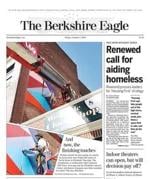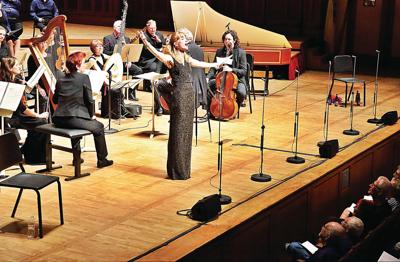LENOX — Tanglewood had another go at "A Midsummer Night's Dream" on Wednesday night, presenting the Handel and Haydn Society of Boston in Purcell's "The Fairy Queen."
Shakespeare's lines don't figure into this take on his play. Nor do Titania and Oberon show their faces. Instead, Purcell's 1692 adaptation works around the edges of the play, introducing a whole set of new characters, including a Chinese couple — apparently an allusion to a Chinese connection to William and Mary, the monarchs at the time.
There are also a drunken poet, a pair of lovers named Coridon and Mopsa — Mopsa made her coy appearance in drag — plus assorted gods, goddesses, allegorical personages such as Night, Mystery and Secrecy, and all four of the seasons (before Vivaldi!). Love denied (see Mopsa above), and then conquering all, is the frothy theme. Hymen, preceded by Phoebus in martial airs, appears at the end to bind up all wounds.
The production made a kind of sequel to the Boston Symphony's partial staging of Mendelssohn's "Midsummer Night's Dream" music five nights before. Where the BSO show was all over the stage, bustling and confusing, action in the Handel and Haydn performance was minimal and tended to be static, with soloists making discreet entrances from within the chorus.
The musical performance, however, held up its end. Offering a garden of musical delights, Harry Christophers conducted the chorus, period-instrument orchestra and 10 soloists with crisp definition gauged to the style and spirit of the times.
"The Fairy Queen" was originally an entertainment with dialogue spoken by actors. Speech was interspersed with musical numbers, including a masque in each act. In the H & H production, there was no dialogue. Instead, a lengthy, excessively clever and only intermittently intelligible narration, written by Jeremy Sams and archly delivered by Antonia Christophers, described what would have been happening in a full production.
One of the most charming numbers was a trio (sung by the full chorus) invoking the God of Wit to join with the birds in making the stars shine; a duet for recorders provided dulcet birdsong, while trumpets sounded echoes. Lightly strummed violins made a drowsy accompaniment to a song by Night invoking "soft Repose." A soprano's song of weeping recalled Dido's lament in Purcell's "Dido and Aeneas."
There is no star or leading singer in a pageant like this, but if there were, the laurel would go to bass-baritone Matthew Brook, who staggered around the stage as the tippling poet and appeared as a booming Coridon and Hymen besides. The other soloists alternated in roles.
The Berkshires this summer have hosted Aston Magna, the Boston Early Music Festival, Apollo's Fire and now Handel and Haydn. Could early music have found a home?


